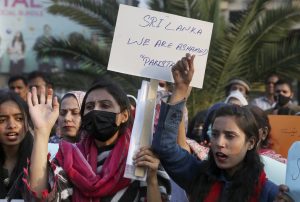Last week, a Sri Lankan man, Priyantha Kumara, an employee at a sports equipment factory in Pakistan’s Punjab province, was beaten to death and set ablaze by a mob over allegations of blasphemy. This was not an isolated incident; at least 80 extrajudicial murders or mob lynchings have taken place under similar circumstances since the 1990s in Pakistan.
However, this is perhaps the first case involving a foreign national of a friendly country. The incident is significant for several reasons and it offers insight into the magnitude of the crisis that Pakistan faces.
The incident has surely taken everyone, including Pakistan’s religious groups, by surprise as it shows the weaponization of conversations over blasphemy laws could eventually set the whole country on fire and ruin whatever is left of its economy and foreign policy.
It’s alarming that the mob which killed and burned Kumara was driven by the Tehreek-i-Labbaik Pakistan (TLP) ideology and slogans calling call for severe punishment against blasphemers. Some of the perpetrators, while talking to local media after the murder, proudly justified their acts by saying that they had “rightfully sent him [Kumara] to hell.”
After reports and videos on social media linked the incident to the TLP, the party’s Sialkot wing said its workers were not involved in the incident. At this point, it is irrelevant what TLP says about the incident as the youth’s radicalization and the ruling political class’ indifference to the problem have grown to a level that people either want to murder someone to be hailed as the next guardian of Islam or just don’t care if someone dies.
Publicly, Pakistan’s politicians may have come out strongly in condemnation of the incident. But this doesn’t necessarily mean that they view religious radicalization as a problem in general. For instance, following the incident, Pakistan’s Defense Minister Pervez Khattak described the killing as the work of “angry, charged youngsters who were swept away by religious emotions.”
“Even I can get excited and do wrong when it comes to religion,” Khattak told local media. “Boys do such things in passion,” he added.
Pakistan’s social media feeds are filled with young boys preaching hate and asking others to do the same. The damage we see is only the tip of the iceberg as numerous such messages of hate do not make it to social media and damage is done at schools, seminaries, and other public gatherings.
The issue is not confined to a degree where the banning of one party or leader could address the problem. It has spread to an extent that the state will have to seriously think about comprehensive reforms, particularly efforts to regulate the religious seminaries and school curricula.
This is perhaps the first time in many years that Pakistan’s civil and military leadership have come together to collectively condemn an incident of extremism related to the issue of blasphemy.
For some, this happened because the victim was not a Pakistani national and thus, it required a furious response. For others, the condemnations poured in because the issue had foreign policy implications and Islamabad needed to send an acceptable and laudable message to foreign capitals and the media, showcasing that the country was committed to addressing the problem.
So far, we have only heard speeches, stating that acts of religious violence will not be tolerated, but does this mean anything? No one is talking about what needs to be done and should be done to start work on the difficult reforms needed to stop this madness.
What if the next victim belongs to another friendly country? Who will consider investing in Pakistan when the danger of being lynched looms large? Who will come to visit the country as the next potential tourist destination when tourists fear for their lives?
The incident in Sialkot happened at a sports factory that was expecting a foreign delegation. It is unclear what happened to that delegation, but the area where the incident happened contributes a significant amount to Pakistan’s exports. Why would anyone want to visit or invest in Sialkot if it means you could lose your life if you touched the wrong sticker or asked for a hygienic atmosphere in the workplace?

































